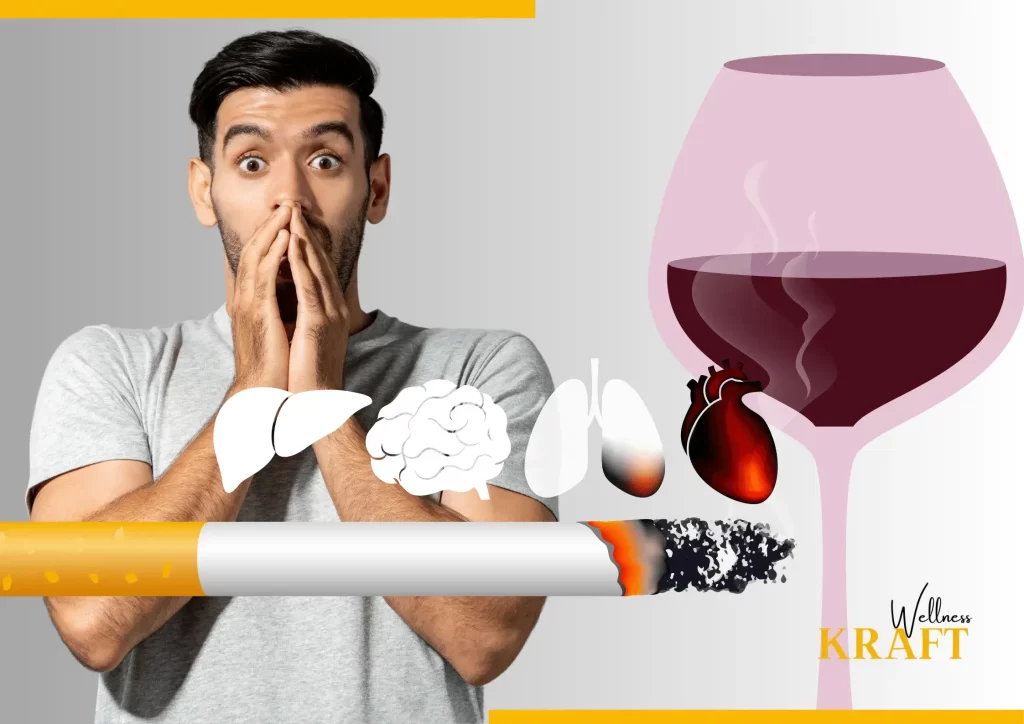“Quitting smoking and alcoholism is not an act of vulnerabilities, but rather an affirmation of the power and will within you to regain ownership of your health and happiness.” – Wellness Kraft
Introduction
An important first step in enhancing your health and wellbeing is deciding to give up smoking and limit alcohol consumption. You can harm your physical, mental, and emotional health in a number of ways by smoking and drinking too much alcohol. In order to successfully stop smoking and cut back on your alcohol consumption, we will give you helpful tips and techniques. You can start your journey to a healthier and happier life by putting these tips into practise.
Table of Contents
The Health Consequences of Smoking and the Abuse of Alcohol

Significant health concerns associated with smoking and excessive alcohol consumption should not be ignored. Knowing these dangers exist might be a strong incentive to quit these habits for the sake of your health and wellbeing.
Nicotine, tar, and carbon monoxide are just a few of the toxic substances that smoking tobacco exposes you to. These drugs can seriously damage your respiratory system and increase your risk of developing emphysema and chronic bronchitis. In addition to raising the risk of bladder, mouth, oesophageal, and throat cancers, smoking is a major contributor to lung cancer.
It also has a negative impact on cardiovascular health. It significantly increases the risk of peripheral vascular disease, heart disease, and stroke. Additionally, it harms the blood vessels, reducing blood flow and raising the risk of blood clots.
A lot of consumption might be harmful to your health. It puts the liver under a lot of stress, which may result in diseases including cirrhosis, fatty liver disease, and alcoholic hepatitis. It lowers immunity, leaving you more susceptible to diseases and infections.
It may also have a negative effect on a person’s mental health. It can exacerbate anxiety and depressive symptoms, decrease cognitive ability, and support the emergence of alcohol-related psychiatric problems. Excessive drinking increases the likelihood of mishaps, injuries, and violent crimes.
Knowing these health dangers is a powerful motivator to stop smoking and cut back on alcohol consumption. You may protect your health, lessen the possibility of developing life-threatening diseases, and enhance your general wellbeing by adopting positive adjustments.
Inspiration to Cut Back on Alcohol and Stop Smoking

To succeed in your quest for better health, you must find the drive to put alcohol consumption on hold and stop smoking. Making these beneficial improvements is worthwhile for a variety of reasons.
First and foremost, you can greatly enhance your physical health by quitting smoking and consuming less alcohol. You can lower your risk of getting lung cancer and other serious respiratory illnesses. Additionally, as it lowers the risk of heart disease, stroke, and blood clots, your cardiovascular health will also improve. Reducing the consumption can also boost your immune system and improve liver function.
Quitting these bad habits can improve your mental and emotional health in addition to their physical advantages. It can help with depression and anxiety symptoms, as well as cognitive performance and general mental clarity. It use can improve sleep quality, lessen mood fluctuations, and promote emotional stability.
Saving money might also be a motivator. Excessive consumption can be costly vices. You can save a sizable sum of money by quitting, which you can use for other priorities or put away for the future. In a similar vein, reducing consumption over time can result in significant savings.
It can also improve your social interactions and relationships. Given that smoking is prohibited in many public places, it might cause social obstacles. You can take advantage of a wider range of social settings by quitting without feeling excluded or stigmatised. By encouraging clear communication, reducing disagreements, and supporting healthier lifestyle choices, cutting back on alcohol can also enhance the quality of your relationships.
This may be personal accomplishments and sources of pride. It takes resolve, willpower, and self-discipline to break these habits. You can improve your self-esteem, retake control of your life, and motivate those around you by effectively quitting these habits.
Create a Quitting Plan and Establish Clear Goals

Setting clear goals and developing a comprehensive quitting plan are essential for success when it comes to quitting smoking and reducing alcohol consumption. Here are a few tactics to get you going:
1.Set attainable and clear goals. Identify the reasons for your desire to quit these habits. A clear purpose will help you stay motivated, whether it’s to improve your health, inspire your loved ones, or take back control of your life. To serve as a regular reminder of what you want to accomplish, write down your goals and keep them visible.
2.Divide up your goals into more achievable, smaller steps. If you want to quit cigarettes consumption, you might want to establish a quit date or consider gradually reducing the number of cigarettes you smoke each day. Set restrictions on how much alcohol you’ll drink each time or how many days a week you’ll consume it to help you cut back. Establish a schedule for accomplishing these milestones.
3.Look for resources and professional assistance. Your chances of success can be significantly improved by seeking professional support and making use of the resources that are available. For advice tailored to your particular needs, speak with your doctor or other healthcare provider. They are able to offer guidance, recommend support groups or counselling sessions, and, if necessary, write prescriptions for drugs.
4.Look for regional or online forums or support groups where you can speak with people going through comparable situations. These networks offer invaluable support, accountability, and shared solutions.
5.Consider installing apps for your phone that can assist you in cutting back on alcohol or smoking. These apps provide tracking options, inspirational messaging, and desire management capabilities. They may be effective instruments for maintaining your motivation and focus.
6.Learn about the detrimental effects of excessive alcohol consumption and smoking. Knowing the risks and repercussions can help you stay committed to quitting. To replace the routines and habits connected with it, look at alternative coping techniques like exercise, meditation, or taking up a hobby.
Locate Constructive Substitutes and Coping Strategies

Finding alternatives and coping techniques to replace these habits is crucial when trying to stop smoking and limit alcohol consumption. Here are some ideas to aid you in the procedure:
1. Alternative Interests:
Discover alternative interests and pursuits that make you happy and fulfilled by exploring new hobbies and pursuits. Exercise, such as walking, cycling, or dancing, can increase endorphin levels and elevate your mood and pursuits. Exercise, such as walking, cycling, or dancing, can increase endorphin levels and elevate your mood. Take up a creative hobby, such as writing, painting, or gardening, to focus your attention on worthwhile activities.
2. Practise relaxation strategies:
To effectively control stress and desires, learn and apply relaxation strategies into your everyday routine. You can stay calm and focused while reducing the impulse to smoke or drink by practising deep breathing exercises, gradual muscle relaxation, and mindfulness meditation.
3. Remain physically active:
Regular exercise not only enhances your physical health but also helps you feel better mentally. Take part in enjoyable activities like swimming, jogging, or fitness classes. Endorphins, which are released when you exercise, help to naturally improve your mood and decrease cravings.
4. Find health and distractions:
When cravings strike, divert your attention with health and alternatives. Take up hobbies that occupy your hands and head, such as creative work, puzzles, or playing an instrument. Your focus can be diverted from smoking or drinking by engaging in delightful activities.
5. Connect with supportive people:
Create a network of supportive family members, friends, or even support groups created especially for people trying to give up these bad habits. Sharing your journey with others who are experiencing the same challenges may be a great source of support, counsel, and friendship.
6. Understand the benefits:
Learn about the advantages for your health, attractiveness, and general well-being. Knowing the long-term advantages can bolster your determination and inspire you to stick with your goals.
7. Prioritise self-care:
Make it a point to take care of your physical, mental, and emotional wellbeing. Get enough rest, consume a healthy diet, and partake in enjoyable and relaxing activities. Holistic self-care can help you feel less stressed and lay the groundwork for a healthier lifestyle.
8. Seek professional assistance:
If necessary, speak with medical professionals or addiction specialists who can offer personalised guidance, treatment alternatives, and extra resources to support your efforts to quit smoking and reduce alcohol consumption.
Remember that quitting these habits requires finding healthy alternatives and coping techniques. Be kind to yourself and enjoy the process of learning new skills and techniques. You can successfully adopt healthier behaviours and enhance your general well-being with willpower, support, and an emphasis on self-care.
Building a Supportive Network

Building a supportive network can dramatically improve your chances of success as you start the road to stopping smoking and limiting alcohol consumption. Having a solid support network can offer inspiration, responsibility, and comprehension. Building a supportive network can be done in the following ways:
1. Share your goals:
Be honest with your family, friends, and loved ones about your intentions for quitting smoking and reducing alcohol consumption. Tell them why you care about this and how their support can help. Their comprehension of your dedication and provision of the required support will be aided by your sharing your aims.
2. Find support groups:
Look for local or online networks that concentrate on quitting smoking and reducing alcohol consumption. Individuals with comparable challenges and goals can be connected in these groups in a secure setting. From those who are travelling a similar path, you can learn from one another’s experiences, obtain insightful information, and receive encouragement.
3. Recruit a companion for accountability:
Look for a dependable friend or relative who can act as your accountability partner. This person can be a source of encouragement, follow-up on your development, and motivational support. Maintaining your dedication may be easier if you have someone who holds you accountable and is aware of your goals.
4. Think about getting professional support:
Speak with therapists, counsellors, or healthcare practitioners who have experience dealing with addiction and behavioural change. They can offer direction, plans, and individualised support catered to your unique needs. Insightful advice and assistance in overcoming challenges might be provided by professional support.
5. Avoid harmful influences:
Identify people or circumstances that might enable or encourage smoking or binge drinking to avoid harmful influences. Reduce your exposure to these effects as much as possible, especially at the beginning of your journey. Assemble a support system of others who share your commitment to living a healthy lifestyle.
6. Participate in neighbourhood activities:
Join clubs or groups in your neighbourhood that support a healthy, drug-free lifestyle. This will provide you with chances to connect with others who share your values and goals and to create a network of people.
7. Celebrate the milestones:
When you attain milestones in your effort to quit these bad habits, celebrate them with your support network. No matter how modest, share your accomplishments with others so they can support you. Your motivation will increase, and you’ll be more likely to stick with it if you’re able to see your progress and get encouragement.
Keep in mind that creating a supportive network is a continuous effort. Your success may be significantly impacted by the people you surround yourself with who understand and support your goals. Lean on your network during trying times, celebrate your victories, and don’t be afraid to ask for assistance when you need it. You may lay a solid foundation for long-lasting change and a healthier, happier life by working together.
Research Analysis:
According to World Population Review Here are the 10 countries with the highest smoking rates:
Here are the 10 countries with the most alcohol consumption:
Latvia – 13.19 liters/year
Moldova – 12.85 liters/year
Germany – 12.79 liters/year
Lithuania – 12.78 liters/year
Ireland – 12.75 liters/year
Spain – 12.67 liters/year
Uganda – 12.48 liters/year
Bulgaria – 12.46 liters/year
Luxembourg – 12.45 liters/year
Romania – 12.34 liters/year
Conclusion
In conclusion, quitting smoking and reducing alcohol consumption are revolutionary steps towards better health. You may empower yourself to make positive changes in your lifestyle by putting the tips given in this article into practise.
Setting clear goals, seeking support, locating health alternatives and coping mechanisms, creating a supportive network, making lifestyle changes, overcoming challenges and relapses, and celebrating milestones are all essential components to supporting your journey.
There are many health advantages to giving up smoking and reducing alcohol consumption. The benefits to your health are substantial, ranging from enhanced cardiovascular health and a stronger immune system to improved lung function and a lower risk of several malignancies.
Wellness Kraft highlights the value of using services, including support groups, healthcare practitioners, and addiction specialists, as well as getting professional assistance. To help you overcome challenges and succeed, these professionals can offer you individualised guidance, treatment alternatives, and extra tactics.
In conclusion, quitting both require dedication, persistence, and support. You are taking important steps towards a healthier, happier life by putting the tips and methods in this article into practise. Maintain your motivation, keep focused, and appreciate the healthy adjustments you’re making.
Key Takeaways
1. Better health and wellbeing can be achieved by quitting smoking and reducing alcohol consumption.
2. You can maintain your concentration and motivation by setting clear goals and developing a quit plan.
3. Using resources like support groups and healthcare professionals can help you find helpful advice and assistance. You can also consider getting professional support.
4. In order to control cravings and lessen the desire to smoke or drink, it can be helpful to find healthy alternatives and coping techniques.
5. Creating a support network of family and friends can give you motivation and hold you accountable.
6. Long-term success requires adopting new lifestyle practises, addressing triggers, and using stress management approaches.
7. Finding support and changing your approach can help you recover from challenges and relapses.
8. Achieving milestones and rewarding yourself can help you stay motivated and reinforce good conduct.
FAQs
1. Is there a way to improve my health by quitting smoking and reducing alcohol consumption?
Yes, there are several health advantages to quit such as increased lung function, lowered illness risk, and improved general wellbeing.
2. How can I maintain my motivation to stop smoking and cut back on my alcohol consumption?
You can stay motivated on your journey by setting clear goals, enlisting the support of loved ones, and celebrating milestones.
3. Is there a professional resource that can assist me in quitting smoking and reducing my alcohol consumption?
Yes, there are healthcare professionals, therapists, and support organisations that specialise in addiction and behavioural change that can offer direction and support.
4. What are some healthy alternatives and coping skills for controlling cravings?
Exercising, using relaxation techniques, and discovering new interests or hobbies can all help divert attention from cravings and offer healthier coping skills.
5. Is there a way for me to overcome challenges and relapses?
Examine the circumstances that contributed to the relapse, enlist the support of your network, and modify your plans as necessary to overcome challenges and get back on track.
6. To support quitting smoking and reducing alcohol consumption, is it crucial to adopt lifestyle changes?
Yes, adopting changes to your lifestyle, such as managing triggers, developing a healthy routine, and surrounding yourself with supportive people, can substantially support your efforts.
7. Is it possible for me to celebrate milestones along the way?
Definitely! It’s crucial to commemorate milestones in order to recognise your development and reward constructive behaviours. Enjoy rewards for yourself and take care of yourself.
8. What long-term health advantages can be gained from quitting smoking and reducing alcohol consumption?
Long-term health advantages include a stronger immune system, greater lung function, and a decreased risk of numerous malignancies and cardiovascular conditions.
9. Is it typical for challenges and relapses to occur along the way?
Yes, it is common to have difficulties and even relapses. To stay motivated and continue on your journey, it’s crucial to learn from these setbacks and seek support.
10. Can reducing alcohol consumption and quitting smoking result in a healthier and happier life?
Definitely! It can enhance one’s physical and mental health as well as their general quality of life.










